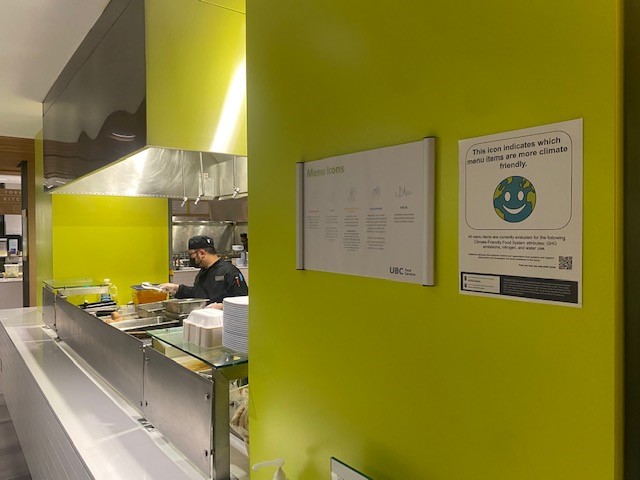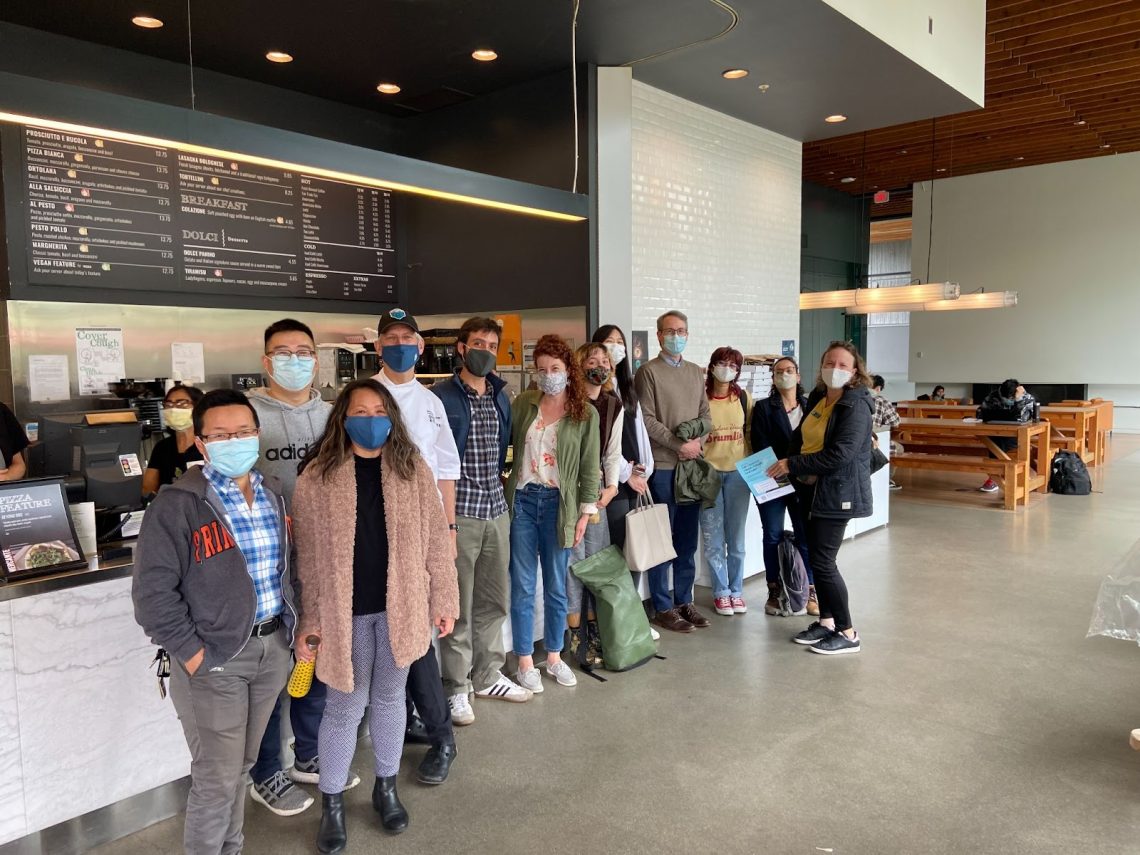How climate-friendly is your food at UBC? According to recent studies, labels encourage more sustainable food choices and change how we eat.
This first UBC Climate-Friendly Food System Label research project was carried out in three main phases from Summer 2021 to May 2022, where the research teams tested different icon iterations’ impact on the UBC community behaviour.
Phase 1: The 3 tiered colour system (red, yellow, green) has been tested in the first phase (August to September 2021) at Mercante pizzeria on the UBC Vancouver campus as a first icon to indicate the climate-friendliness of a meal (Graphic design by Helen Eady, Creative Co).
Phase 2: A traffic-light system has been developed for the second phase (October to January 2022) and added on some menu items at Mercante pizzeria and Open Kitchen managed by Food Services to measure the impact of a label on food choice student behaviour. Here is the poster that has been developed as complementary information to inform UBC Community on this label (Graphic design by Helen Eady, Creative Co).
Phase 3: A single happy planet icon (Graphic design by Mallory Lupick) focusing only on a positive message has been selected through 3 side-by-side concept mock-ups to represent the UBC Climate-Friendly Food System Label from February to June 2022. Two UBC dining halls located in campus residences participated in the study. One was the treatment location, while the other was a control site.
A food meal labelled with the happy planet icon means that this food menu item has at least a 50% lower environmental footprint per 100 grams than other items.
This project shows how people from different backgrounds and expertise can work together towards the same goal, promoting the Climate-Friendly Food Systems at UBC.
In light of the climate emergency, for most of those consulted, as well as the observed sales results, most of the UBC community wants to be more informed about the environmental impact of our food choices.
A simple, easy-to-understand label icon showing colour range seems to be the right direction on UBC’s campus as a next step to expand the Climate-Friendly Food System (CFFS) Label.
Student perspective


Background and interests
Yu Luo works under the supervision of Dr Jiaying Zhao, he is a PhD candidate in the Department of Psychology at UBC. His research focuses on applying behavioural insights to address environmental issues (e.g., plastic pollution and climate change)
Yu Luo plans to continue collaborating with academic, industry, and government partners to conduct research on mitigating environmental issues.
He learned about the Climate-Friendly Food System (CFFS) Label project from his supervisor, Jiaying, since I have led many environmental projects in his lab.
The CFFS label project aligned with the topic of his PhD dissertation. His dissertation focuses on how to use Behavioural interventions to tackle environmental issues. Implementing CFFS labels to change consumers’ food choices on campus perfectly matched his dissertation.
“This project gave me a great opportunity to test out behavioral interventions in a real-world context and the findings of this project can contribute to solving a real challenge at UBC as I led the field experiments and online surveys in Phases 1 and 2 of the project,” said Yu Luo.
In phase 1 and phase 2, findings showed that the majority of the survey’s participants supported the implementation of the CFFS Label on the UBC campus, and the results showed that adding a label to a menu item shifted participants’ food choices from high GHG emission food to low GHG emission food.
CFFS Label Impact
According to Yu Luo: “If we implement the CFFS label at all food services locations on campus, we will see a large reduction in GHG emissions from food systems at UBC. Ideally, I hope that we can implement the CFFS Label in all restaurants at UBC, even at private food providers on campus that are not part of UBC Food Services.
The SEEDS team and all our partners were very supportive throughout the project. They helped us find the key contact person for a specific request, implement the CFFS Label at various locations, and extract the sales data that we needed. It was fantastic to work with a team in which everyone shares the same vision and works toward the same goal“.
Finally, Yu Luo concludes with the following benefits he gets from this SEEDS research community-based collaboration:
“With this SEEDS opportunity, I had a chance to work with a large team. It helped me gain communication and team skills. Importantly, this project gave me an opportunity to test out behavioral interventions outside a laboratory context“.
CFFS Label Next Steps
The team behind the CFFS Labels is looking for your feedback! From February to April 2023, the team will collect survey responses on the new CFFS label seen below:

The survey link (found here) is open now, and in March 2023, a focus group will be organized to gather more opinions to ensure the icon speaks to the UBC community. For more information, visit Climate-Friendly Food Labels for the latest update on the CFFS Labels.



